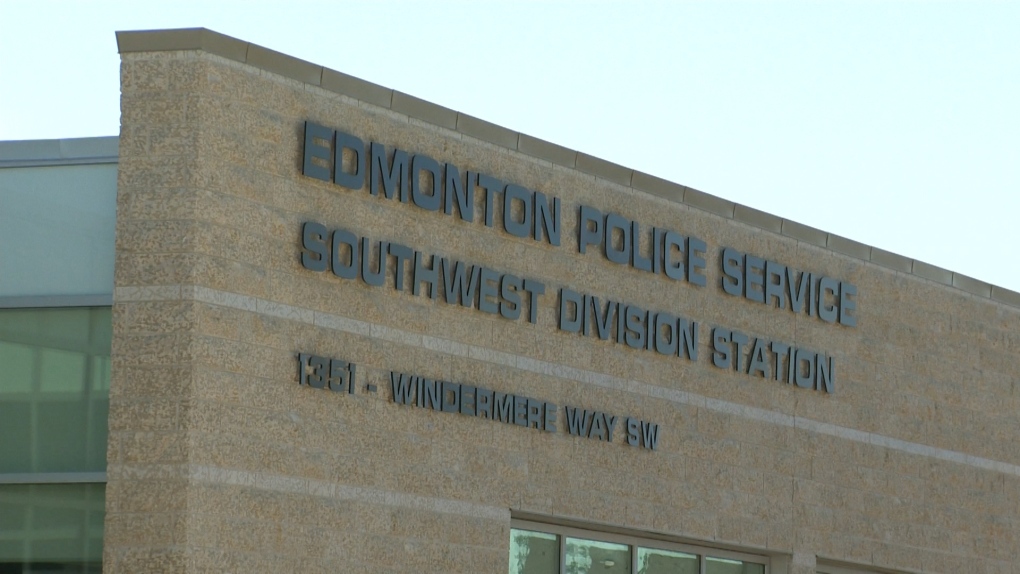No EPS wrongdoing for 2020 in-custody death, ASIRT finds, as probe poses medical assessment questions
 File photo: EPS Southwest Division station. (CTV News Edmonton)
File photo: EPS Southwest Division station. (CTV News Edmonton)
Alberta's police watchdog cleared the Edmonton Police Service of any negligence after an intoxicated man died in its custody but questions have been raised about whether or not officers should have brought him to the hospital first.
The Alberta Serious Incident Response Team (ASIRT) was directed to review an early morning incident in June 2020 where a man was taken into police custody after a disturbance at a southwest Petro-Canada gas station.
Around 4 a.m., officers responded for a report of a man appearing to be under drugs and acting "agitated."
The unnamed 48-year-old man was taken to the southwest division station after officers recognized he had been involved in two other trespass calls earlier that day, ASIRT recounted in the report.
Officers assessed the man but did not notice any signs of medical distress, ASIRT said. While police considered the risk the man posed to himself, officers believed placing him in a cell "would be the safest place for him."
ASIRT later determined that the man had taken crystal meth before his interaction with police and that community peace officers performed proper health checks on him while he was in police custody.
Despite this, roughly three hours after being placed in a cell, the man died. An autopsy found he died of methamphetamine toxicity. The medical examiner said it was possible "that had he been taken to the hospital instead of the police station, his life would have been saved."
In an interview with ASIRT investigators, the medical examiner elaborated, saying that a person found in a confused or abnormal state should be taken to hospital or seen by a paramedic before being placed in a holding cell.
"His intentional drug use was the cause of his death and had no connection to his detention by police," wrote Matthew Block, ASIRT assistant executive director, in his decision. "However, liability can still result for anyone responsible for the affected person while he was detained."
An internal EPS review of the incident was also undertaken, ASIRT said. EPS policy says if there are any doubts about a detainee's medical condition, officers are to always "resolve" them "in favour of the detainee's wellbeing."
Based on the evidence made available to ASIRT, Block said there were no reasonable grounds to believe the officers involved committed an offence.
Block added that while police officers have specialized training, they are not medical professionals.
"As such, they must be alive to situations where it may be important to have a person in their custody medically assessed," Block said. "Again, the standard is reasonableness and not perfection."
CTVNews.ca Top Stories

B.C. seeks ban on public drug use, dialing back decriminalization
The B.C. NDP has asked the federal government to recriminalize public drug use, marking a major shift in the province's approach to addressing the deadly overdose crisis.
More than 115 cases of eye damage reported in Ontario after solar eclipse
More than 115 people who viewed the solar eclipse in Ontario earlier this month experienced eye damage after the event, according to eye doctors in the province.
Orca calf that was trapped in B.C. lagoon for weeks swims free
An orca whale calf that has been stranded in a B.C. lagoon for weeks after her pregnant mother died swam out on her own early Friday morning.
Last letters of pioneering climber who died on Everest reveal dark side of mountaineering
George Mallory is renowned for being one of the first British mountaineers to attempt to scale the dizzying heights of Mount Everest during the 1920s. Nearly a century later, newly digitized letters shed light on Mallory’s hopes and fears about ascending Everest.
Sophie Gregoire Trudeau on navigating post-political life, co-parenting and freedom
Sophie Gregoire Trudeau says there is 'still so much love' between her and Prime Minister Justin Trudeau, as they navigate their post-separation relationship co-parenting their three children.
'I was scared': Ontario man's car repossessed after missing two repair loan payments
An Ontario man who took out a loan to pay for auto repairs said his car was repossessed after he missed two payments.
Trump's lawyers try to discredit testimony of prosecution's first witness in hush money trial
Donald Trump's defence team attacked the credibility Friday of the prosecution's first witness in his hush money case, seeking to discredit testimony detailing a scheme between Trump and a tabloid to bury negative stories to protect the Republican's 2016 presidential campaign.
U.S. flight attendant indicted in attempt to record teen girl in airplane bathroom
An American Airlines flight attendant was indicted Thursday after authorities said he tried to secretly record video of a 14-year-old girl using an airplane bathroom last September.
Powerful tornado tears across Nebraska, weather service warns of 'catastrophic' damage
Devastating tornadoes tore across parts of eastern Nebraska and northeast Texas Friday as a multi-day severe thunderstorm event ramped up in the central United States.






























